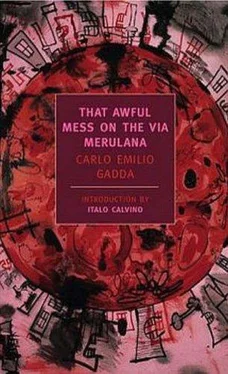Carlo Emilio Gadda
That Awful Mess on the via Merulana
INTRODUCTION by Italo Calvino
IN 1946, when he started That Awful Mess on Via Merulana, Carlo Emilio Gadda intended to write not only a murder novel, but a philosophical novel as well. The murder story was inspired by a crime that had recently been committed in Rome. The philosophical inquiry was based on a concept announced at the novel's very outset: nothing can ever be explained if we confine ourselves to seeking one cause for every effect. Every effect is determined by multiple causes, each of which has still other, numerous causes behind it. Every event, a crime for example, is like a vortex where various streams converge, each moved by heterogeneous impulses, none of which can be overlooked in the search for the truth.
A view of the world as a "system of systems" had been expounded in a notebook found among Gadda's papers and published after his death. Using his favorite philosophers, Spinoza, Leibniz, and Kant, as a starting point, the writer had constructed a "discourse on method." Every element of a system contains within it another system; each individual system in turn is linked to a genealogy of systems. A change in any particular element results in a breakdown of the whole.
What matters most is how this philosophy of knowledge is reflected in Gadda's style, in his language, which is a thick amalgam of folk expressions and learned speech, of interior monologue and artistic prose, of various dialects and literary quotations. The same philosophy is also apparent in the narrative, where the slightest details are enlarged until they occupy the entire frame, concealing or effacing the overall design. And so it happens in this novel, where the murder story, little by little, is forgotten. We seem about to discover the murderer's identity and motive when the description of a defecating hen demands our attention more strongly than the solution of the mystery.
The seething cauldron of life, the infinite stratification of reality, the inextricable tangle of knowledge are what Gadda wants to depict. When this concept of universal complication, reflected in the slightest object or event, has reached its ultimate paroxysm, it seems as if the novel is destined to remain unfinished, as if it could continue infinitely, creating new vortices within each episode. Gadda's point is the superabundance, the congestion, of these pages, through which a single complex object — the city of Rome — assumes a variegated form, becomes organism and symbol.
For, again, this book is not meant to be only a detective novel or a philosophical novel, but also a novel about Rome. The Eternal City is the true protagonist of the book, with its social classes ranging from the middle bourgeoisie to the underworld, the voices of its various dialects surfacing in the melting pot, its extroversion and its murkiest unconscious. In this Rome, the present blends with the mythical past, Hermes and Circe are invoked in connection with the most plebeian vicissitudes, and characters who are domestic servants or petty thieves bear the names of Aeneas, Diomedes, Ascanius, Camilla, Lavinia, like the heroes and heroines of Virgil. The ragged, brawling Rome of the neorealist cinema, in its golden age when Gadda wrote the novel, takes on a cultural, historical, mythical dimension that neorealism ignored. And the Rome of art historians also plays a part, in references to Renaissance and Baroque painting, descriptions of the feet of saints and their huge big toes.
A novel of Rome, written by a non-Roman. At the time he wrote That Awful Mess, Gadda knew Rome only from having lived there a few years in the 1930s, when he had worked as director of the Vatican's thermoelectric plant. He was in fact Milanese and closely identified with the bourgeoisie of his native city, whose values of concrete practicality, technical efficiency, and moral principle he saw being swept away as another Italy — conniving, raucous, and unscrupulous — prevailed. But even if his stories and his most autobiographical novel, Acquainted with Grief, are rooted in the society and dialect of Milan, it is That Awful Mess that brought him to the attention of a wider public, a novel written to a large extent in Roman dialect and where Rome is seen and comprehended with an almost physiological penetration, in its most infernal aspects, like a witches' sabbath.
Gadda was a man of contradictions. An electrical engineer, he tried to master his hypersensitive, anxious temperament with a rational, scientific mentality, but he simply exacerbated it instead; and in his writing he gave vent to his irascibility, his phobias, his fits of misanthropy, which in his everyday life he repressed behind the mask of ceremonious politeness belonging to a gentleman of another age.
Critics considered him a revolutionary in his use of language and narrative form, an expressionist, a follower of Joyce. He had this reputation from the beginning in the most exclusive literary circles, and it was renewed when the young members of the avant-garde in the 1960s acknowledged him as their master. But in his own literary taste, he was devoted to the classics and to tradition (his favorite author was the sage, calm Man-zoni), and his model in the art of the novel was Balzac. His own work displayed some of the fundamental gifts of nineteenth-century realism or naturalism in its portrayal of characters, settings, and situations through their physical substance, through material sensations as, for instance, the tasting of a glass of wine at the dinner with which the book opens.
Fiercely critical of the society of his time, animated by a visceral hatred of Mussolini (seen in his sarcastic description of the emphatic set of the Duce's jaw), Gadda shied away from any kind of radicalism in politics; he was a moderate man of order, respectful of the law, who looked back with nostalgia toward the sound administration of an earlier time; a good patriot, he had been a conscientious officer in the First World War, had fought, and had suffered. This was a fundamental experience for him, though he never got over his indignation at the harm done by incompetence, expediency, vel-leity. In That Awful Mess, which takes place in 1927, during the early years of Mussolini's dictatorship, Gadda does not confine himself to a facile caricature of Fascism: he conducts a minute, extensive analysis of the effects on the daily administration of justice caused by a failure to respect the separation of powers as envisioned by Montesquieu, to whom there is explicit reference.
This constant desire for concreteness, for verification, this appetite for reality are so strong in Gadda's writing that they create a kind of congestion, hypertension, blockage. The characters' voices, thoughts, and sensations, the dreams of their unconscious, are mingled with the author's omnipresence, his fits of impatience, his sarcasm, and the fine network of cultural references. As in the performance of a ventriloquist, all these voices coincide in a single speech, sometimes in the same sentence, with shifts of tone, modulation, falsetto. The structure of the novel is stretched out of shape from within by the excessive richness of the material and the intensity with which the author charges it. The existential and intellectual dramatic force of this distortive process is implicit: comedy, humor, grotesque metamorphosis are natural means of expression for this man whose life was always unhappy, tormented by neurosis, by the difficulty of relations with others, by the anguish of death.
Gadda did not intend that his formal innovations would overturn the structure of the novel; he envisioned constructing solid novels that observed all the rules, but he never succeeded in carrying his plans through to the end. Acquainted With Grief and That Awful Mess seem to need only a few more pages to reach their conclusions. In other cases, he dismembered his novels, breaking them into short stories, and it would not be impossible to reconstruct the originals by piecing together the various fragments.
Читать дальше












